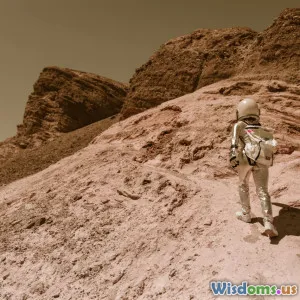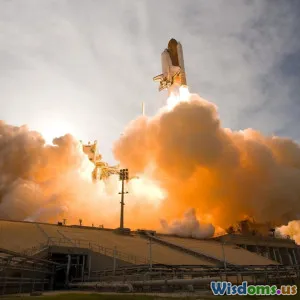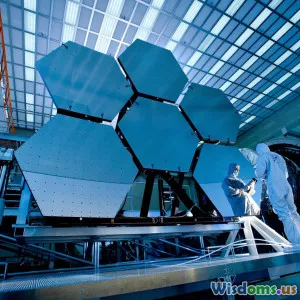
10 Unexpected Challenges Facing Mars Colonists Every Day
8 min read Discover 10 daily unexpected hurdles Mars colonists face and learn how humanity could overcome them on the Red Planet. (0 Reviews)
10 Unexpected Challenges Facing Mars Colonists Every Day
Introduction
The dream of colonizing Mars captures the imagination of millions worldwide. Companies like SpaceX and governments have outlined ambitious plans to establish a human presence on the Red Planet within decades. While much attention is given to the technical and scientific feats required—spaceships, habitats, life support systems—there lie numerous less obvious, but equally critical challenges that Mars colonists will face daily. These aren’t merely problems of technology, but of biology, psychology, environment, and social dynamics, often with ripple effects under extreme planetary conditions.
This article dives deep into 10 unexpected challenges Mars settlers will encounter every single day, shedding light on the real complexities behind living 140 million miles away from Earth.
1. Persistent Martian Dust: More Than Just a Nuisance
Mars is infamous for its pervasive fine dust, consisting of tiny particles that penetrate nearly every crack and crevice. Unlike Earth's dust, Martian dust is chemically reactive and electrostatically charged, making cleanup a herculean task.
- Historical data from the Mars rovers shows dust accumulating on solar panels, reducing energy capacity by up to 30%.
- Astronauts would constantly battle dust intrusion damaging equipment, contaminating living quarters, and even posing health risks by inhalation.
This dust behaves like a silent saboteur, degrading machinery and air quality despite best filtration efforts.
2. Psychological Strain from Isolation and Confinement
Distance from Earth brings monumental psychological stress. Astronauts aboard the International Space Station operate under short missions with relatively quick communication. Mars colonists face:
- Communication delays up to 22 minutes one-way.
- Months or years without relief or physical connection to Earth.
- Monotony and confinement within limited habitats.
Studies from Antarctic stations and submarines reveal increased risks of depression, anxiety, irritability, and group conflicts. Supporting astronauts' mental health will demand innovative solutions.
3. Sleep Disruption Due to Mars’ Unique Day-Night Cycle
A Martian sol lasts approximately 24 hours and 39 minutes. While seemingly close to Earth’s 24-hour circadian rhythm, studies suggest that the small difference can cause significant sleep cycle shifts over time.
- Poor sleep quality affects cognitive performance, mood, and physical health.
- Colonists will need adjustable lighting schedules and vigilant monitoring to maintain circadian alignment.
4. Radiation Exposure With Limited Shielding
Mars’ thin atmosphere and lack of magnetic field expose colonists to cosmic rays and solar radiation beyond terrestrial levels.
- NASA estimates radiation exposure on the Martian surface can reach up to 660 millisieverts/year, much higher than Earth's average 2.4 millisieverts.
- Long-term exposure increases cancer risk, damage to nervous and cardiovascular systems.
Houses and suits with sufficient shielding, along with careful scheduling of surface activities, will be vital.
5. Food Production Under Stressful Conditions
Mars lacks organic soil and abundant water, essential for agriculture. Relying solely on prepackaged supplies is unsustainable for long missions.
- Growing food requires sophisticated hydroponics or aeroponics, demanding constant monitoring.
- Unexpected issues like microbial infections or nutrient imbalances may arise.
NASA’s Veggie experiment aboard the ISS shows promise but scaling this to Mars’ harsher environment remains a challenge.
6. Unpredictable and Severe Dust Storms
Mars experiences planet-wide dust storms which can last for weeks, blocking sunlight and depleting solar-powered systems.
- The 2018 global dust storm famously ended the Opportunity rover’s mission after 15 years.
- Colonists could face energy shortages and reduced visibility, compromising outdoor tasks and delaying Earth communication.
Emergency protocols and energy redundancy become more than mere precautions.
7. Maintenance Challenges Due to Equipment Wear and Tear
Mars' harsh environment accelerates wear on equipment:
- Abrasive dust erodes seals and joints.
- Thermal cycling causes material fatigue.
Remote troubleshooting or repairs from Earth won’t be timely; settlers need deep skills and ample spare parts.
8. Water Management and Recycling Reliability
Water extraction from Martian soil or atmosphere is complex. Once obtained, water recycling systems must operate with near-perfect efficiency.
- A leak or system failure could be catastrophic.
- Studies in ISS recycling systems reveal the complexity of reliably processing wastewater in closed environments.
Mars colonists will need a zero-margin-for-error approach with built-in redundancies.
9. Ethical and Governance Dilemmas
Life on Mars may start small but will grow into settlements requiring laws, governance, and ethics.
- Questions arise: Who decides resource allocation? How to handle interpersonal conflicts?
- Autonomous decision-making might be necessary due to communication delays.
Fair, transparent systems for community decision-making will be essential to maintain morale and order.
10. The Psychological Impact of Missing Earth’s Natural Environment
Mars lacks familiar Earth stimuli – no blue skies, flowing water, diverse flora, or animal life.
- This sensory deprivation may worsen mental well-being.
- Simulated environments, virtual reality, and biophilic designs could help offset this disconnect.
Astronaut Scott Kelly’s year aboard the ISS revealed how disconnecting from Earth’s natural environment impacts psyche.
Conclusion
The vision of becoming a multiplanetary species on Mars is bold and inspiring. Yet, beyond the headlines and technological triumphs, the daily life of Mars colonists will be marked by unpredictable, multifaceted challenges. Dust infiltration, psychological resilience, solar radiation, and governance issues represent just the tip of the iceberg.
Preparing for these hurdles requires interdisciplinary research combining space engineering, human psychology, biology, and ethics. Mars colonization won't just be a test of technology but a profound exploration of human adaptability and ingenuity. Embracing and solving these unexpected daily challenges is crucial to ensuring humanity's successful step onto the cosmos’ new frontier.
Are we ready for the Martian reality?
References:
- NASA Technical Reports on Mars Radiation Environment
- NASA's Veggie Plant Growth Experiments on ISS
- Scott Kelly’s Year in Space: Psychological Studies
- Mars Dust Analysis from Rovers' Data
- Antarctic Isolation Analog Studies
Rate the Post
User Reviews
Popular Posts



















